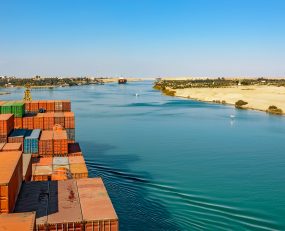
The re-election of President Recep Tayyip Erdogan may have all sorts of implications for Turkey and the region. One of them may be a dramatic addition to the logistics infrastructure of the Mediterranean and Black Sea.
Erdogan, a politician who has built his career on big infrastructure projects, has barely finished the latest extravaganza, the world’s largest airport just north of Istanbul. Now he is keen to start on his next big idea, what he describes as his “crazy project” to build a canal to bypass the Bosphorus.
The idea is not new. There have been suggestions to build a canal west of Istanbul for several centuries. However, faced with the engineering and financial challenges the projects were dropped before any building work was carried out. Erdogan sees himself as the man to persevere where others have failed.
The plans which the present government have outlined are sizeable. The route will cross the peninsula on the European side of Istanbul, from the Sea of Mamara at Kucukcemece to the Black Sea at Karaburun. It will be 50 km long, 165 m wide and large enough to take ultra post-Panamax vessels, with a depth of 25 m. It will be quite comparable to the Suez Canal.
Unsurprisingly there are critics who suggest that such a vast piece of engineering will have a harsh effect on the landscape and that the price of the canal, initially suggested to be US$10bn but possibly rising to over US$15bn, will make the endeavour uneconomic. The business case is not helped by the fact that passage through the Bosphorus is free, whilst the backers of the canal plan to charge a toll.
Yet it is undeniable that the Bosphorus is very busy, with vessels including chemical and oil product tankers passing through an urban conurbation of some 17m people.
If such a canal is built it will be an interesting addition to the logistics of the Mediterranean and the Black Sea. Ports such as Constanza (Romania), Varna (Bulgaria) and those of the Georgian coast will have immediate access to major east-west shipping routes. The transhipment business in the Mediterranean would have some competition.
Whilst Erdogan’s government, strengthened by new presidential powers of decree, will need to come up with spectacular new ideas in order to give his rule some forward momentum, there are significant barriers. In particular, the government simply may not have the money. The Turkish economy has been growing at around 7% per annum through 2018 however it faces increasing inflation, capital account deficits and a weakening currency. Foreign investors appear to be losing faith in an economy where many large companies, including construction companies, are burdened with dollar-denominated debt. Embarking on another mega project may not be ideal given the macroeconomic conditions. Yet politics may trump economics and the eastern Mediterranean may have its traffic patterns transformed.
Source: Transport Intelligence, June 26, 2018
Author: Thomas Cullen